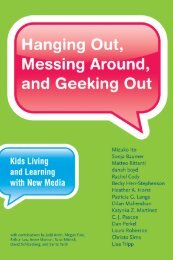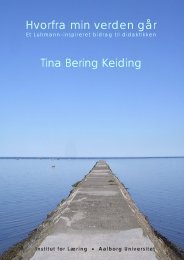Creating-entrepreneurial-mindset
Creating-entrepreneurial-mindset
Creating-entrepreneurial-mindset
- No tags were found...
Create successful ePaper yourself
Turn your PDF publications into a flip-book with our unique Google optimized e-Paper software.
T. KurbanowDoctor's Degree (28%). 5 teacher-respondents (72%) came from the Polish educationalsystem, 2 from the Ukrainian system (28%).Method. The interview was realized by means of the survey containing 13 openendedand 3 close-ended questions. I interviewed most respondents in individual faceto-facesessions (13 people, 72%), others were interviewed via individual Skype synchronousvideo sessions (5 people, 28%), which lasted about 25-30 minutes. The interviewwas conducted in the respondents' native language (Polish, Ukrainian). Since thepopulation was relatively small, and the interview aimed at collecting data, the quantitativemethodology was employed alongside with the descriptive methodology (to analyzethe answers to the open-ended questions).Results. Before moving any further, I intended to ascertain, if the respondents hadthe necessary conditions for constructing the online component of their PLEs, i.e. ifthey had limited or unlimited access to computer devices and Internet (if it was personalor shared), if the usage was restricted by a certain place (home/ university/ workplace),and if they were confident computer-users (obtained basic computer and Internetliteracies). 17 respondents (94%) had in their possession a personal laptop withInternet access, and 1 respondent (6%) – a personal desktop with Internet access. Additionally,more than a half had a mobile phone/ smart phone with Internet access (12people, 67%), and 5 respondents (28%) had another computer or a laptop at work. Therespondents estimated their computer and Internet skills as average (9 people, 50%);above average (5 people, 28%); and below average (4 people, 22%), but admitted tohave no particular difficulties operating basic computer programmers, software, andthe Internet. All respondents reported using computer and Internet daily, both for studyingand entertainment. Graph 1 presents the obtained data concerning opportunitiesand necessary skills for constructing the digital part of Personal Learning Environments.Fig.1. Access to computer devices and Internet.The first group of questions concerned search, categorization and storage of thedigital content. The answers to the question: "Which online search engines do you usefor finding resources?" differed considerably between the subcategories of student- andteacher-respondents. Thus, though every respondent utilizes Google search engine for67





